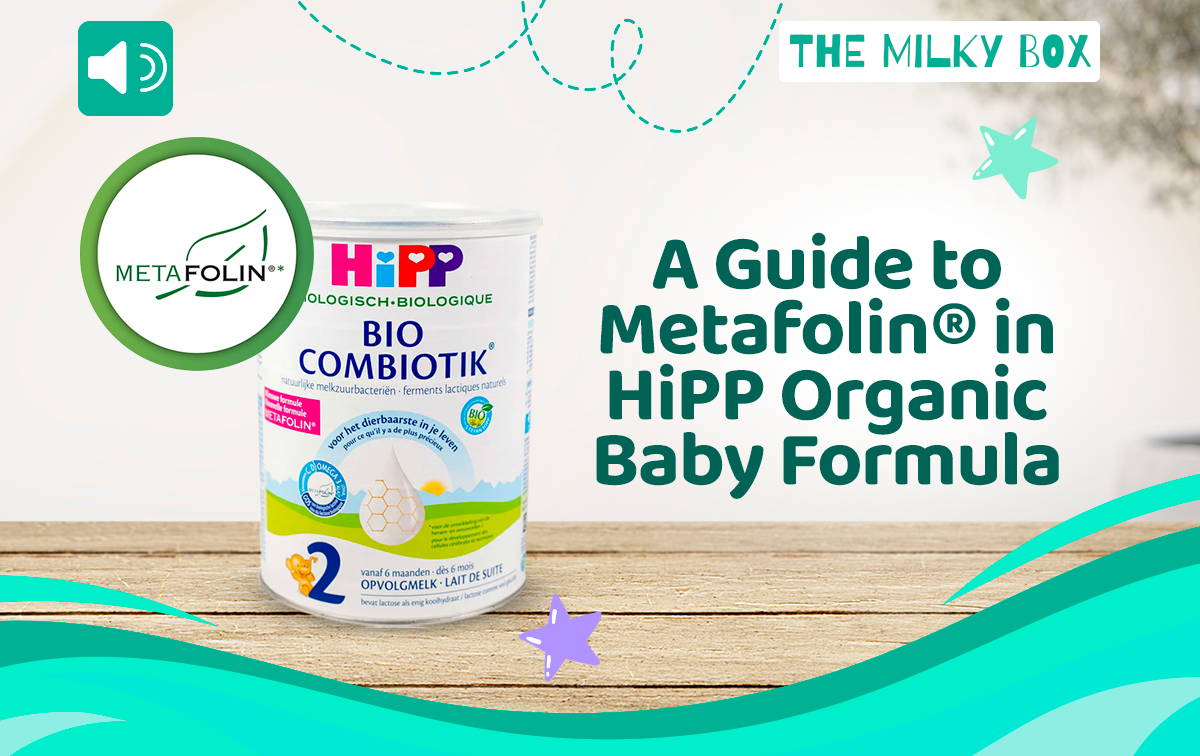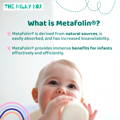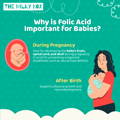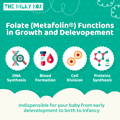Folic acid is the synthetic form of folate, while Metafolin® is the natural form with higher bioavailability.
A Guide to Metafolin® in HiPP Organic Baby Formula
By: Suzanne Renee' - Updated November 22, 2023 - 6 Minute Read

HiPP Infant Nutrition has been a trusted name in the baby formula business for four generations. HiPP's continual research aims to mimic breast milk as closely as possible and improve babies' gut microbiota, which is unsurpassed.
This article highlights the pioneering efforts of HiPP International in infant nutrition, achieved through the strategic integration of scientific principles and natural ingredients. A testament to this forward-thinking approach is the inclusion of Metafolin® in their infant formula products.
What is Metafolin®?
Simply put, Metafolin® is a patented form of folic acid produced using a unique manufacturing process. Metafolin® is derived from natural sources, is easily absorbed, and has increased bioavailability, providing immense benefits for infants effectively and efficiently.
In a much broader scope, Metafolin® is the calcium salt of the active form of folate known as L-5-methyltetrahydrofolate. Folate is required for the production of DNA and RNA in the body.
A key component for cell growth and division, folate is crucial for pregnant mothers and babies.
In addition, this compound donates one of its carbons for synthesizing phospholipids, neurotransmitters, and myelin in the body.

Why is Folic Acid Important for Babies?
Folic Acid is crucial for each part of development. This required ingredient supports the formation of red blood cells, the proper functioning of the nervous system, and the growth of cells and tissues.
Folic acid is vital for developing the baby's brain, spinal cord, and skull during pregnancy; folic acid is especially crucial for preventing congenital disabilities, such as neural tube defects.
For this reason, pregnant women are often advised to take a folic acid supplement. However, babies still need folic acid to support their physical growth and neurodevelopment even after birth.

Folid Acid vs. Metafolin®
Starting from the basic foundation, we can easily compare and see fundamental differences. Folic Acid is a synthetic form of Folate, and Metafolin is a natural calcium salt of folate, also found in breast milk.
Folic Acid
Folic acid requires it to be converted to L-5-methyltetrahydrofolate for it to be used by the body. This conversion occurs in the liver; however, not all of it may be absorbed, and some may enter the circulation as it is.
Unfortunately, infants who take folic acid-fortified baby formulas often have an elevated level of unmetabolized folic acid in their plasma, which is not always helpful to the growing baby.
Furthermore, suppose they are carriers of genetic mutations in the methylfolate pathway (i.e., MTHFR–which more than 40 percent of people are on average). In that case, folic acid can accrue in their bodies and essentially become toxic to them. A methylated vs. synthetic folic acid is needed to ensure this doesn’t happen.
Metafolin®
Metafolin®, fortified baby formula, quickly enters the folate processing cycle and is immediately available and beneficial for your baby. Bioavailability means that it does not put additional stress on the developing liver and does not have to do extra work to metabolize it.

Is Metafolin® Safe?
A family’s primary concern is their infant’s safety and well-being. The EU takes this very seriously and has extensively researched Metafolin to use in baby formulas. Due to the superior safety levels, effectiveness, and bioavailability of Metafolin® in numerous studies, the European Food Safety Authority has also approved Metafolin®.
What Do Scientific Studies Say?
Researchers conducted a controlled study to examine the safety of infant formula enriched with Metafolin®.
The findings were significant for formula-fed babies receiving this bioactive folate. This study had proven folate levels like those found in breastfed infants and infants receiving Metafolin® fortified formula.
How is Metafolin® Used in HiPP Organic Baby formula?
HiPP infant formulas contain folate, an important B vitamin essential for cell division and growth. During the first years, your little ones’ physical development and cognitive growth rely on nutrients to synthesize purine and pyrimidine that provide structure for DNA & RNA molecules.
Folate is crucial for cell division and tissue growth; and is indispensable for brain development, growth, and blood formation, especially in the foundation ages.

Baby Formula with Metafolin®
HiPP International is changing the standards of baby nutrition by including Metafolin® instead of folic acid in their recipe. Along with Metafolin®, HiPP European Baby Formulas blends whey-to-casein ratio to mimic breast milk as closely as possible.
Organic nutrition for every stage and digestive worry, including the most sensitive baby formulas, HiPP Anti-Reflux containing 100% whey, and HiPP HA, which uses extensively hydrolyzed protein.
The Best Baby Formula
Metafolin® is another way European baby formulas set infant nutrition standards—unique innovative, high-quality, organic ingredients.
The Milky Box only carries the best-powdered nutrition, establishing a firm foundation to support your baby's health and well-being today and in the future.
Frequently Asked Questions
What is The Difference Between Metafolin® and Folic Acid?
Why is Metafolin® Necessary?
Metafolin® is essential for cell division and tissue growth and, therefore, indispensable for babies.
Is Metafolin® Natural?
Metafolin® is a naturally occurring calcium salt of (6S)-5-methyltetrahydrofolate acid. It does not require reduction by DHFR and can enter the circulation directly for use in the body.
Disclaimer:
Please be aware that this information is based on general trends in babies, and it is not medical advice. Your doctor should be your first source of information and advice when considering any changes to your child’s formula and when choosing your child’s formula. Always consult your pediatrician before making any decisions about your child’s diet or if you notice any changes in your child.
Breastfeeding is the best nutrition for your baby because breast milk provides your child with all the essential nutrients they need for growth and development. Please consult your pediatrician if your child requires supplemental feeding.

Suzanne Renee' is an accomplished professional with extensive expertise in the area of infant nutrition, dedicated to promoting the health and wellbeing of children. She started this journey as a foster parent. Suzanne has emerged as a strong proponent of the European baby formula and has become a full time writer of the subject. In her free time, she enjoys camping, hiking and going to church.
Read Next:
Reviewed by Dr. Eric Wood, ND, MA

Dr. Wood is a licensed naturopathic doctor, with a doctorate degree from the Canadian College of Naturopathic Medicine in Toronto, Canada. He received his post-graduation certification in Mind Body Medicine at Harvard University.
With 15 years of experience, Dr. Wood is an Associate Professor of Holistic Nutrition at the American College of Health Sciences in Portland, Oregon. Dr. Wood is an educator, clinician, author, media figure, consultant, and owns his own holistic (naturopathic) medical practice in Ft. Lauderdale, Florida. Dr. Wood is currently researching and drafting books on cancer and pediatrics.
Outside of the medical profession, Dr. Wood loves singing with the Miami Lyric Opera and is an avid musician in South Florida. He also loves spending time with his wife and kids.

